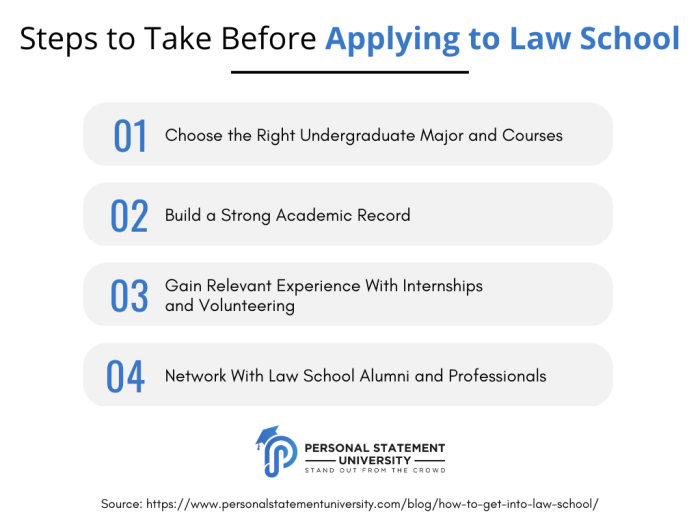
How to get into law schools sets the stage for this enthralling narrative, offering readers a glimpse into a journey filled with challenges and rewards. The path to a legal career is paved with rigorous preparation, strategic application, and a deep understanding of the legal landscape. This guide will explore the crucial aspects of the law school admissions process, from understanding the importance of LSAT scores and GPA to crafting compelling personal statements and securing financial aid.
We’ll delve into the intricacies of LSAT preparation, providing strategies for maximizing your score and navigating the test with confidence. We’ll also explore the importance of extracurricular activities and work experience, demonstrating how these elements can strengthen your application. Finally, we’ll discuss the diverse career paths available to law graduates, offering insights into the job market and the opportunities that await.
Understanding Law School Admissions

Gaining admission to law school is a competitive process that requires careful planning and preparation. Several factors contribute to a successful application, and understanding their importance is crucial. This section will discuss the key components of the law school admissions process, including the LSAT, GPA, personal statement, letters of recommendation, and choosing the right law school.
The Importance of LSAT Scores
The LSAT (Law School Admission Test) is a standardized exam designed to assess a candidate’s reading comprehension, logical reasoning, and analytical skills. It is a critical component of the law school admissions process. The LSAT score is a primary factor used by law schools to evaluate applicants’ potential for success in legal studies.
The LSAT is graded on a scale of 120-180, with the average score typically falling between 150-160. A higher LSAT score generally increases an applicant’s chances of admission to their preferred law schools.
A strong LSAT score is a significant indicator of a candidate’s readiness for the rigors of law school.
Many law schools use a percentile ranking system to evaluate LSAT scores. This system compares an applicant’s score to the scores of other test-takers. For example, an LSAT score in the 90th percentile means that the applicant scored higher than 90% of other test-takers.
It is important to note that while a high LSAT score is essential, it is not the only factor considered in the admissions process. Other factors, such as GPA, personal statement, and letters of recommendation, also play a crucial role.
The Role of GPA in Law School Applications
GPA (Grade Point Average) is another significant factor considered by law schools. It reflects an applicant’s academic performance in undergraduate studies. A high GPA demonstrates a strong academic foundation and commitment to learning.
While the GPA requirement varies among law schools, most institutions seek applicants with a GPA of 3.0 or higher.
A strong GPA demonstrates a commitment to academic excellence, which is considered essential for success in law school.
Law schools often consider the applicant’s GPA in conjunction with their LSAT score. They look for a balanced profile that reflects both strong academic performance and analytical abilities.
The Significance of Personal Statements and Letters of Recommendation
The personal statement and letters of recommendation provide a more nuanced understanding of an applicant’s qualifications beyond standardized test scores and GPA.
Personal Statement
The personal statement is an opportunity for applicants to showcase their unique experiences, motivations, and goals for pursuing a legal career. It allows them to articulate their passion for the law, their intellectual curiosity, and their commitment to making a difference in the legal profession.
Letters of Recommendation
Letters of recommendation are written by individuals who can attest to an applicant’s character, work ethic, and potential for success in law school. These individuals may include professors, employers, or community leaders who have had significant interactions with the applicant.
Strong personal statements and letters of recommendation provide a more comprehensive picture of an applicant’s qualifications, highlighting their individual strengths and potential for success in law school.
Tips for Choosing the Right Law School
Choosing the right law school is a critical decision that should be made after careful consideration of various factors.
- Location: Consider the location of the law school and its proximity to your desired legal market or practice area.
- Reputation: Research the law school’s reputation, ranking, and faculty expertise in areas that interest you.
- Program Focus: Determine if the law school offers specialized programs or areas of study that align with your career goals.
- Student Body: Explore the student body composition, class size, and the law school’s commitment to diversity and inclusion.
- Career Services: Evaluate the law school’s career services resources and its track record of placing graduates in successful legal careers.
Preparing for the LSAT
The LSAT (Law School Admission Test) is a standardized test that is used by law schools to assess the academic abilities of prospective students. A strong LSAT score can significantly enhance your chances of getting into your dream law school. It is a challenging exam, but with adequate preparation and a strategic approach, you can achieve a score that reflects your true potential.
LSAT Preparation Strategies
A well-structured LSAT preparation plan is crucial for success. The following strategies can help you effectively prepare for the exam:
- Understand the Exam Format: Familiarize yourself with the LSAT’s structure, question types, and scoring system. The LSAT consists of five scored sections: Reading Comprehension, Logic Games, Logical Reasoning, and two unscored sections (experimental and writing sample). You can access past LSATs from the official website for practice and familiarize yourself with the exam format.
- Take Diagnostic Tests: Start by taking a few diagnostic LSATs to assess your strengths and weaknesses. This will help you identify areas that require more focus during your preparation.
- Develop a Study Plan: Create a study schedule that allocates sufficient time for each LSAT section. It’s recommended to start preparing at least 3-6 months before the exam date. Break down your study plan into manageable chunks and allocate specific time slots for each section.
- Use LSAT Prep Resources: Several excellent LSAT prep resources are available, including books, online courses, and practice tests. These resources provide comprehensive coverage of LSAT topics, strategies, and practice questions.
- Focus on Weak Areas: Once you identify your weaker areas, dedicate more time and effort to improving them. Utilize specific resources and practice questions tailored to these areas.
- Practice Regularly: Consistent practice is essential for improving your LSAT score. Take full-length LSAT practice tests under timed conditions to simulate the actual exam environment.
- Analyze Your Mistakes: After each practice test, carefully analyze your mistakes to identify recurring patterns or areas that need more attention. Review the concepts and strategies associated with the questions you answered incorrectly.
- Develop Time Management Skills: The LSAT is a timed exam, so it’s crucial to develop effective time management skills. During practice tests, learn to pace yourself and allocate time strategically for each section.
Study Plan
A well-structured study plan is crucial for LSAT preparation. Here’s a sample study plan that you can customize based on your individual needs and learning style:
- Months 3-4: Focus on understanding the LSAT format, question types, and scoring system. Take diagnostic tests to assess your baseline score and identify areas for improvement. Begin with foundational concepts in logic, reading comprehension, and analytical reasoning.
- Months 2-3: Deepen your understanding of LSAT topics and strategies. Practice with dedicated LSAT prep books, online courses, and practice tests.
- Months 1-2: Refine your strategies and practice with full-length LSAT practice tests. Analyze your mistakes and focus on improving your weaker areas. Develop effective time management skills and practice taking the exam under timed conditions.
- Month 1: Review your study materials and take practice tests under timed conditions to simulate the actual exam environment. Focus on maintaining your momentum and staying confident.
Managing Test Anxiety
Test anxiety is a common concern for LSAT test-takers. Here are some tips for managing test anxiety:
- Practice Relaxation Techniques: Engage in relaxation techniques like deep breathing exercises, meditation, or yoga to calm your nerves before the exam.
- Positive Self-Talk: Replace negative thoughts with positive affirmations. Remind yourself of your strengths and preparation efforts.
- Get Enough Sleep: Adequate sleep is crucial for optimal cognitive function and stress management. Aim for 7-8 hours of sleep the night before the exam.
- Eat a Healthy Breakfast: A nutritious breakfast provides energy and helps you focus during the exam. Avoid sugary or processed foods that can lead to energy crashes.
- Arrive Early: Arrive at the testing center early to avoid rushing and give yourself time to settle in.
Understanding LSAT Scoring and Percentile Rankings, How to get into law schools
The LSAT is scored on a scale of 120-180, with a higher score indicating better performance. The LSAT score is important for law school admissions as it provides a standardized measure of your academic abilities. The LSAT score is reported as a percentile, which represents the percentage of test-takers who scored at or below your score. For example, a score in the 90th percentile means you scored higher than 90% of other test-takers.
The LSAT score is a significant factor in law school admissions, but it’s not the only factor. Law schools also consider your GPA, letters of recommendation, personal statement, and extracurricular activities.
Crafting a Strong Application
Crafting a compelling application is crucial for your law school journey. It’s your chance to showcase your qualifications, aspirations, and suitability for the program. A strong application goes beyond just good grades; it requires a strategic approach that highlights your unique strengths and aligns with the values of the law schools you’re targeting.
Personal Statement
The personal statement is your opportunity to tell your story and articulate your reasons for pursuing a legal career. It’s a chance to connect with the admissions committee on a personal level, showcasing your passion for the law, your unique experiences, and your intellectual curiosity.
A strong personal statement is more than just a list of accomplishments; it’s a compelling narrative that demonstrates your understanding of the legal profession, your intellectual curiosity, and your commitment to making a difference.
A compelling personal statement typically includes:
* A clear and engaging introduction: Start with a strong hook that grabs the reader’s attention and sets the stage for your story.
* A compelling narrative: Share a personal story or experience that highlights your interest in law, your intellectual curiosity, and your ability to think critically.
* Specific examples: Use concrete examples to illustrate your skills, experiences, and values.
* A clear and concise conclusion: End with a strong statement that reiterates your passion for law and your commitment to making a difference.
Letters of Recommendation
Letters of recommendation are essential components of your application, providing insights into your character, work ethic, and academic potential from individuals who know you well.
Strong letters of recommendation provide a third-party perspective on your abilities and potential, adding depth and credibility to your application.
When selecting recommenders, consider individuals who can:
* Speak to your strengths: Choose recommenders who can provide specific examples of your skills, achievements, and qualities relevant to law school.
* Highlight your potential: Seek recommendations from individuals who can speak to your intellectual curiosity, your ability to think critically, and your commitment to excellence.
* Demonstrate your character: Choose recommenders who can attest to your integrity, work ethic, and personal qualities.
Extracurricular Activities and Work Experience
Extracurricular activities and work experience demonstrate your commitment to service, your leadership abilities, and your ability to balance multiple responsibilities.
Extracurricular activities and work experience showcase your ability to manage time, work effectively in a team, and contribute to the broader community.
When highlighting your extracurricular activities and work experience, focus on:
* Leadership roles: Showcase your leadership skills and ability to motivate others.
* Community involvement: Demonstrate your commitment to service and your desire to make a positive impact.
* Transferable skills: Highlight skills that are relevant to the legal profession, such as communication, critical thinking, and problem-solving.
Tailoring Applications to Specific Law Schools
Each law school has its own unique values, culture, and admissions criteria.
Tailoring your application to each law school demonstrates your genuine interest and your understanding of their specific program and values.
To tailor your application effectively, consider:
* Researching each school’s mission and values: Understand the school’s priorities and how your qualifications align with their goals.
* Identifying relevant coursework and experiences: Highlight coursework and experiences that are directly related to the school’s areas of focus.
* Personalizing your essays and cover letter: Address the school’s specific values and demonstrate your understanding of their unique program.
Financing Your Legal Education

Law school is a significant financial investment, and understanding your options for funding your education is crucial. This section will guide you through the various financial aid options available to law students, including student loans, scholarships, and grants.
Student Loans
Student loans are a common way for law students to finance their education. There are two main types of student loans: federal and private.
Federal student loans are offered by the U.S. Department of Education and often have more favorable terms than private loans, such as lower interest rates and flexible repayment options.
Private student loans are offered by banks, credit unions, and other financial institutions. These loans typically have higher interest rates and may require a creditworthy cosigner.
Types of Federal Student Loans
- Direct Subsidized Loans: These loans are need-based and the government pays the interest while you’re in school, during grace periods, and during deferment periods. You don’t have to start making payments until after you graduate or leave school.
- Direct Unsubsidized Loans: These loans are not need-based, and interest starts accruing as soon as the loan is disbursed. You can choose to pay the interest while in school, but you are not required to.
- Direct PLUS Loans: These loans are available to graduate students and parents of dependent undergraduate students. They have higher interest rates than subsidized or unsubsidized loans and require a credit check.
Types of Private Student Loans
- Fixed-rate loans: These loans have a fixed interest rate that will not change over the life of the loan. This provides predictability and makes budgeting easier.
- Variable-rate loans: These loans have an interest rate that fluctuates based on market conditions. This can lead to higher payments over time, especially if interest rates rise.
Scholarships and Grants
Scholarships and grants are forms of financial aid that do not need to be repaid. They are often awarded based on academic merit, financial need, or other criteria.
Types of Scholarships
- Merit-based scholarships: These scholarships are awarded based on academic achievement, such as GPA or LSAT score.
- Need-based scholarships: These scholarships are awarded based on financial need, often determined by the Free Application for Federal Student Aid (FAFSA).
- Diversity scholarships: These scholarships are designed to support students from underrepresented backgrounds, such as minority groups, first-generation college students, or students with disabilities.
Types of Grants
- Federal Pell Grants: These grants are awarded to undergraduate students with exceptional financial need. They do not need to be repaid.
- State grants: Many states offer grants to students attending law schools within their state. Eligibility requirements vary by state.
- Institutional grants: Some law schools offer their own grants to students based on academic merit, financial need, or other criteria.
Managing Student Debt
Managing student debt is an important aspect of financing your legal education. Here are some tips for effectively managing your debt:
- Understand your loan terms: Carefully review your loan agreements to understand the interest rates, repayment terms, and any other conditions.
- Prioritize repayment: Create a budget that prioritizes your loan payments. Consider making extra payments whenever possible to reduce the principal balance and save on interest.
- Explore repayment options: There are several repayment options available, such as income-driven repayment plans, which adjust your monthly payments based on your income.
- Consider consolidation: If you have multiple loans, consider consolidating them into a single loan with a lower interest rate. This can simplify your repayment process and save money on interest.
Exploring Career Paths in Law

A law degree opens doors to a wide array of career paths, offering diverse opportunities to make a difference in society. From advocating for clients in court to shaping legal policy, the legal profession provides a platform for individuals with strong analytical skills, a passion for justice, and a desire to contribute to the legal system.
Legal Specialties
The legal profession encompasses a wide range of specialties, each requiring unique knowledge, skills, and experience. Understanding these specialties is crucial for aspiring lawyers to identify areas that align with their interests and career goals.
- Criminal Law: This area involves representing individuals accused of crimes, navigating the complexities of the criminal justice system, and advocating for their rights. Criminal lawyers play a vital role in ensuring fair trials and protecting the rights of the accused.
- Civil Law: This branch of law focuses on disputes between individuals, businesses, or organizations. Civil lawyers represent clients in matters such as contracts, property, personal injury, and family law. They strive to resolve disputes peacefully through negotiation, mediation, or litigation.
- Corporate Law: This specialty involves advising businesses on legal matters, including mergers and acquisitions, corporate governance, and compliance with regulations. Corporate lawyers play a crucial role in ensuring that businesses operate legally and ethically.
- Environmental Law: This area focuses on protecting the environment and ensuring compliance with environmental regulations. Environmental lawyers represent clients involved in environmental disputes, advocate for sustainable practices, and contribute to environmental policy development.
- Intellectual Property Law: This specialty involves protecting intellectual property rights, such as patents, trademarks, and copyrights. Intellectual property lawyers advise clients on strategies for protecting their inventions, brands, and creative works.
The Role of Internships and Clerkships
Internships and clerkships play a pivotal role in career development for aspiring lawyers. These experiences provide valuable hands-on training, exposure to real-world legal practice, and networking opportunities.
- Internships: Internships offer students the chance to work alongside experienced lawyers, observe legal proceedings, and gain practical skills in legal research, writing, and client interaction. They provide a valuable introduction to the legal profession and help students explore different areas of law.
- Clerkships: Clerkships are typically offered to law graduates and involve working for judges or attorneys in a more formal setting. Clerkships provide in-depth exposure to legal analysis, case management, and judicial decision-making. They are highly competitive and can be a stepping stone to prestigious legal careers.
The Job Market for Lawyers
The job market for lawyers can be competitive, influenced by factors such as economic conditions, legal trends, and the demand for specific legal specialties.
- Competition: The legal profession is highly competitive, with a large pool of graduates seeking limited positions. Aspiring lawyers must stand out by demonstrating strong academic performance, relevant experience, and exceptional communication and analytical skills.
- Specialization: Specialization can enhance job prospects, as employers often seek lawyers with specific expertise. Identifying a niche area of law and developing expertise can make aspiring lawyers more attractive to potential employers.
- Networking: Networking is crucial for job seekers in the legal profession. Attending industry events, connecting with alumni, and leveraging online platforms can help aspiring lawyers build relationships and gain insights into potential opportunities.
Final Review
Embarking on a legal career is a journey that requires dedication, perseverance, and a passion for justice. By understanding the key elements of the law school admissions process and utilizing the strategies Artikeld in this guide, aspiring lawyers can navigate this challenging path with confidence. The journey may be demanding, but the rewards of a legal career are immeasurable, offering the opportunity to make a meaningful impact on society and advocate for those who need it most.
General Inquiries: How To Get Into Law Schools
What is the average LSAT score?
The average LSAT score varies each year, but it typically falls between the 150-151 range.
How important is GPA in law school admissions?
GPA is a significant factor in law school admissions, but it’s not the only factor. Law schools consider a holistic application, including your LSAT score, personal statement, and extracurricular activities.
Are there any tips for writing a strong personal statement?
Be authentic, focus on your unique experiences and motivations, and showcase your writing skills.
What are some common legal career paths?
Common legal career paths include corporate law, criminal law, family law, and environmental law.





